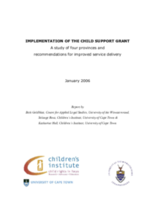Since its inception in 1998, the Child Support Grant (CSG) has been rolled out very rapidly and now reaches more than seven million children. It is having a significant impact on the alleviation of poverty by increasing children’s access to food, education and health care.
Despite this remarkable achievement, not all poor children are managing to access the grant. The way in which the grant is implemented is not always consistent across provinces or even within provinces. Certain implementation problems mean added burdens for poor primary care-givers in their interaction with the Department of Social Development (DSD), and some of the other government departments. Many of these problems can be easily solved and conditions be improved for grant applicants and beneficiaries. Such improvements would go a long way towards the realisation of all people’s rights to social assistance, as set out in Section 27 of the South African Constitution. Improvements in implementation would also bring current practice in line with administrative law as set out in the Constitution, legislation and common law.
This report brings together the findings of the two fieldwork studies, with recommendations for improved delivery of the CSG. The first part of the report deals with the methodology of the research. The second part covers aspects of lack of consistent and coherent implementation of the current Social Assistance Act 59 of 1992 and makes recommendations for the improvement of implementation and the setting of norms and standards. The final part of the report examines issues that require changes in the law and provides recommendations for paring down the regulations and altering the law to make for a more streamlined and accessible social grants administration.
©Children's Institute, University of Cape Town, and Centre for Applied Legal Studies, University of the Witwatersrand

